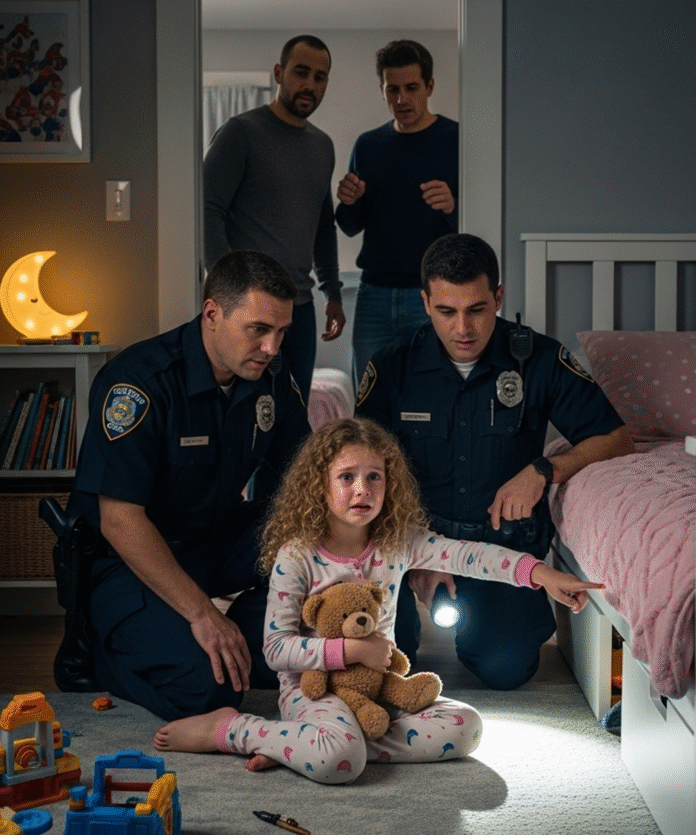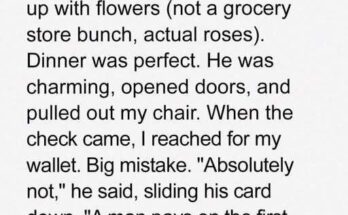The Call That Wouldn’t Let Go
After twelve years working as a 911 dispatcher, Kara believed she had heard it all — the panic, the confusion, the false alarms, and the long silences that follow real fear. But one late evening, a call came through that she would never forget.
“Please come fast,” a small voice whispered. “Someone is whispering under my bed. I hear them. I’m scared.”
The caller’s name was Mia, age five. Her words came out in quick bursts between shaky breaths.
“Mia, where are your parents?” Kara asked, keeping her tone calm.
“They don’t believe me,” Mia said softly. “They say I make things up. But I can still hear it… right now.”
And then Kara heard something faint on the line — not just Mia’s breathing, but another sound. Thin. Wet. Whispering.
This wasn’t a prank.
“Stay on the line with me,” Kara said. “Help is coming.”
The Door That Opened with Doubt
Ten minutes later, two patrol cars eased down a quiet street in a small suburban neighborhood, their lights dimmed to avoid waking the block. The front door opened before they could knock.
Mia’s father stood there, half irritated, half embarrassed. “She called again? She’s got an imagination, that one.”
“We’ll just check, sir,” said Sergeant Lewis. “It’ll only take a moment.”
Inside, the little girl waited in her room in pajamas decorated with tiny moons, gripping her stuffed bear. She didn’t rush to the officers; she simply pointed toward her bed.
“The voice comes from there,” she whispered.
Officer Patel crouched, lifted the bed skirt, and shone his flashlight beneath the pink quilt. Dust bunnies, a fallen crayon, a marble — nothing more.
“It’s clear, kiddo,” he began gently.
The Whisper That Stopped Everyone
“Wait,” Sergeant Lewis said suddenly.
The room went still. Even over the open phone line back at dispatch, Kara could hear the silence stretch.
Thirty long seconds passed.
Then it came — soft, damp, almost like fabric against paper. A whisper. Followed by three faint knocks.
Mia’s eyes filled with tears. “That’s it,” she said. “That’s what I heard.”
The Hidden Vent
Officer Patel lowered the flashlight again, this time sweeping along the baseboard. That’s when he noticed a small metal rectangle — a return vent, nearly hidden behind the bed frame.
The whispering was louder now.
“Sound’s coming through the duct,” Lewis said quietly.
They listened. And then came a word — cracked, hoarse, and unmistakable.
“Help.”
Mia’s mother gasped. Her father stepped back, pale. Kara, still listening from the call center miles away, wrote the word in capital letters across her report.
The Search Beneath the House
Within minutes, backup arrived with building plans. The homes on that street were old post-war construction — two units sharing a common wall and duct system.
Patel tapped on the drywall near the vent. Three knocks. A pause. Three faint taps came back.
“It’s next door,” Lewis said. “Check the crawlspace access.”
They crossed the porch to the neighboring house. No cars. No lights. The door was unlocked. Inside, everything looked ordinary except for a faint line of light at the back of the house.
The officers followed it to a small utility room. Behind the dryer, a sheet of plywood leaned awkwardly against the wall — hiding a dark opening.
“Police!” Lewis called out.
A thin voice floated up from the hole. “Please… help.”
The Woman Under the Floor
Patel knelt and shone his flashlight into the crawlspace. The beam caught the outline of a woman curled on the packed earth, her arm twisted under a metal pipe, her gray sweater torn.
“Ma’am, we’re here,” Lewis said softly. “Don’t move. We’ll get you out.”
The woman blinked at the light, lips cracked, eyes glazed. Around her wrist was a medical alert bracelet that read: ALVAREZ, CAROLINE — DIABETIC.
She had been missing for more than twenty-four hours.
Later, investigators learned she had gone down to her own utility room after hearing a banging sound and slipped through the loose hatch. Her leg had caught under a pipe. Too weak to yell, she whispered for hours — her voice traveling through the vents into Mia’s room next door.
The Rescue
Firefighters and medics arrived quickly. They widened the crawlspace opening and freed Ms. Alvarez with careful precision. Wrapped in blankets, she was rushed to the hospital — cold, dehydrated, but alive.
“She kept tapping,” Patel told Kara over the radio. “Long enough for that kid to hear her.”
“And long enough,” Kara replied quietly, “for everyone else to finally believe her.”
The Lesson in Listening
Before leaving, Sergeant Lewis knelt beside Mia.
“You were brave,” he said. “You kept listening. You asked for help when no one else did.”
Mia nodded solemnly. “I didn’t want her to be alone.”
Her mother broke down, tears running over relief and guilt. “I should have listened,” she said softly. “I should have checked.”
Mia hugged her stuffed bear. “It’s okay,” she said. “We can believe each other next time.”
The Official Report
The paperwork was brief and factual:
Caller reported suspicious noise. Officers investigated. One adult female located in adjoining unit’s crawlspace. Rescued and transported to hospital.
But the lesson spread quietly through the department — shared between shift changes and over family dinners. Sometimes the smallest voice in the room is the one telling the truth.
A Neighborhood Changed
Two weeks later, the block gathered for a potluck to celebrate Ms. Alvarez’s recovery. New vent covers were installed, crawlspace hatches were sealed, and neighbors started looking out for one another in ways they hadn’t before.
That night, as Mia settled into bed, she tucked her bear under her arm and listened to the soft, reassuring hum of the heater. No whispers. Just warmth and safety.
Why This Story Matters
It’s easy to dismiss what children say, to wave away their fears as imagination. But sometimes, their sensitivity catches what adults miss.
This story is more than a rescue — it’s a reminder:
- Believe children when they tell you something feels wrong.
- Keep vents, crawlspaces, and shared walls secure and inspected.
- Check in on neighbors, especially those who live alone.
Because one small voice, heard in time, can save a life.



